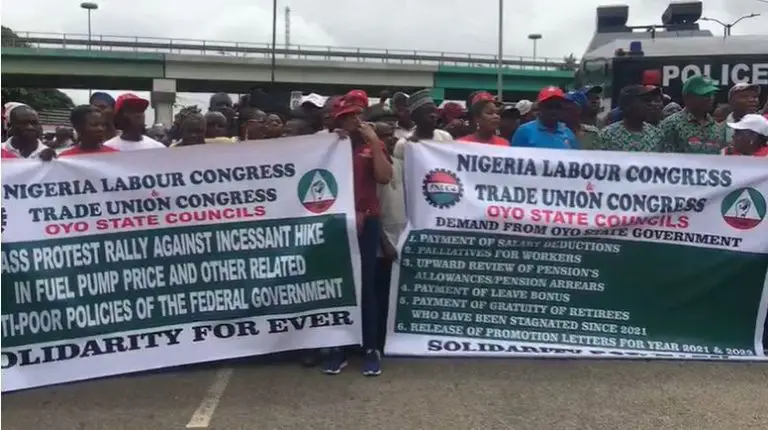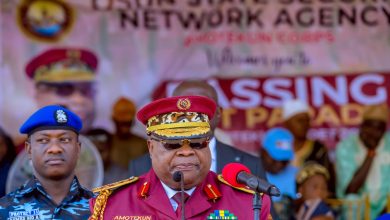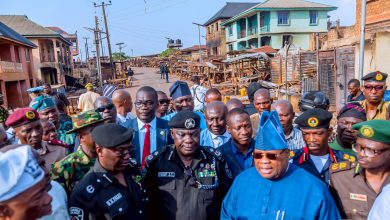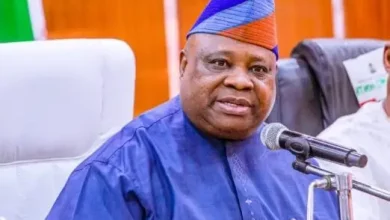NLC demands N30,000 subsidy palliative for six months in Lagos as protests observed in Ogun, Osun
NLC protests nationwide

The Lagos State chapter of the Nigeria Labour Congress (NLC) has requested N30,000 subsidy palliative from the state government to assuage the hardship caused by the fuel subsidy removal.
Funmi Sessi, the chapter’s chairperson, made this known while presenting a charter of demands to the deputy governor of the state, Kadri Hamzat, on Wednesday.
It followed a protest by workers in the state in compliance with a national civil act called by organised labour on Wednesday.
Our correspondents also observed the protests in Ogun and Osun states.
In Lagos, placards-carrying protesters converged at the Ikeja Underbridge around 6:30 a.m. to demand from the government “let poor Nigerians breathe, end fuel price increase, stop Naira devaluation, fix local refineries”, amongst other demands.
By noon, they had gained entry into the premises of the state House of Assembly.
The protesters include the NLC, Trade Union Congress (TUC) and other affiliated unions.
Nationwide, Nigerian workers are protesting the harsh economic conditions.
Human rights lawyer Femi Falana and presidential candidate of the African Action Congress (AAC) in the 2023 election, Omoyele Sowore, joined the protest in Lagos.
We need a subsidy palliative. Our minimum wage can no longer take care of our burdens,” Ms Sessi said while addressing the deputy governor.
Many people are dying and hungry. We know the state government is trying, but they still need to do more.
We need a subsidy palliative of N30,000 each for workers for the next six months. We know the government has slashed BRT fares, but we want to be able to put food on our table. Some of us have cars; we need to buy fuel.
We want health care to be affordable. Agencies and parastatals should get buses to transmit workers to and fro.
We want a stakeholders dialogue with the state government. We also need food banks; we want stomach infrastructure; it is very important.”
Mr Hamzat, in his response to the labour unions, said they would look into their demands.
He spoke after receiving a letter containing a charter of demands from leaders of the protest.
We have heard you, a lot of things have been said, and the letter has been given to us,” he said.
What we all want is a better Nigeria, and I’m sure that we will get there. The leadership has said that we should dialogue. We will have a dialogue, and you will hear from us very soon.
The organised labours and members of other organisations in Osun and Ogun States also joined the national protest.
The protest in Osogbo, Osun State, began on Monday.
The protest, tagged “Let the poor breath”, was organised by a coalition of labour unions and rights organisations.
During the demonstration on Monday, the chairman of the coalition, Waheed Lawal, declared that protests would continue until government looks into their demands.
On Wednesday, the protesters again took off from the popular Nelson Mandela Freedom Park and moved to major parts of the city
A union leader, Sodiq Yusuf, called on President Bola Tinubu to address insecurity and review policies negatively affecting the people.
We are out today to demand the abolition of all anti-masses policies by the federal government. We are saying enough to incessant petroleum price hikes.
We are saying enough to insecurity that is ravaging the nooks and cranny of our land. We are saying enough about corruption. We are saying enough about the commercialisation of education. Nigerian masses are saying enough to incessant abuse of power.
He also demanded a review of the national minimum wage.
The civil action was peaceful, with the police and operatives of the other security agencies observing from a distance.
In Ogun State, the protesters also marched peacefully on major streets of Abeokuta singing solidarity songs.
The protests are in compliance with the directive of the President of the NLC, Joe Ajaero.
Last Wednesday, Labour issued a seven-day ultimatum to the federal government to reverse all “anti-poor” and “insensitive” policies with special attention on fuel subsidy.






